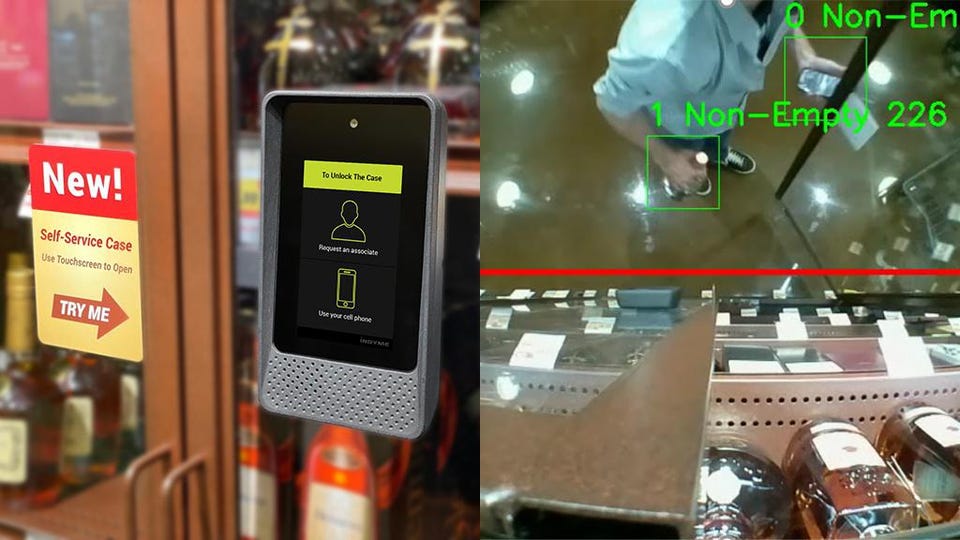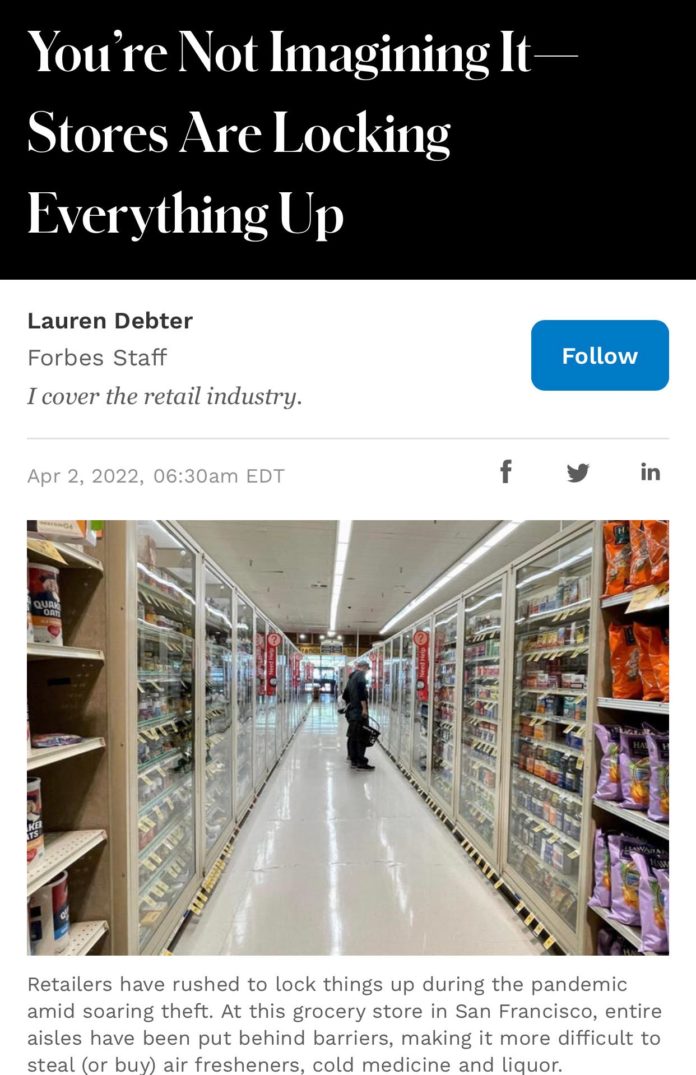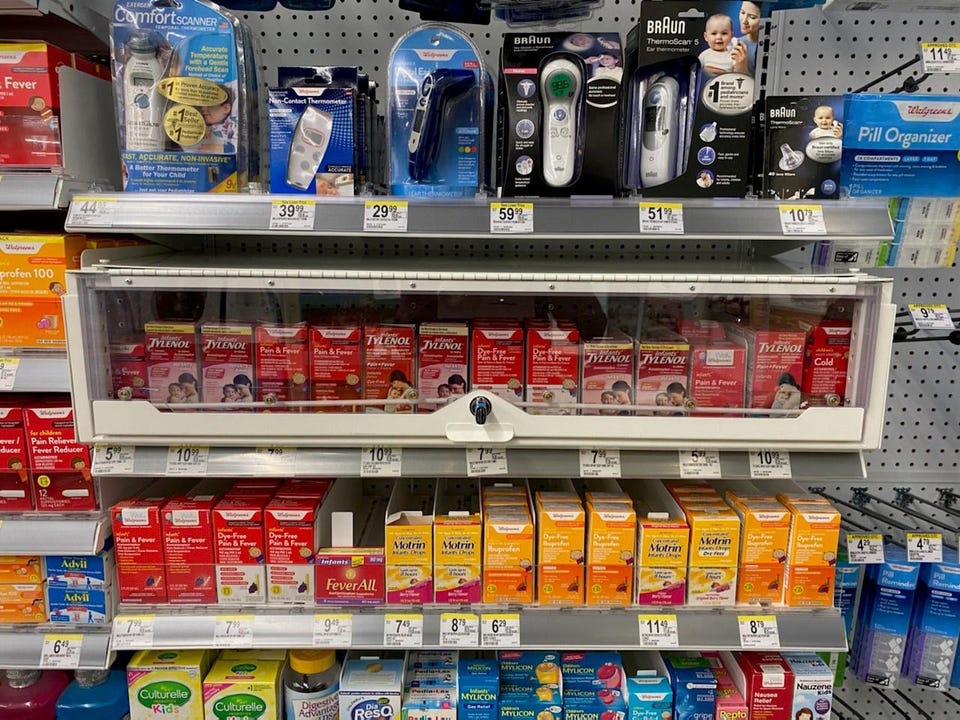People, younger generations in particular, are steadily being conditioned into the mark of the beast system. In certain stores you won’t be able to pick up items off the shelves without first logging personally identifying data.
Revelation 13:17 | And that no man might buy or sell, save he that had the mark, or the name of the beast, or the number of his name.
Source: Forbes
Frustration among shoppers is prompting retailers to test a new type of locked case that can be opened with your smartphone.
When 29-year-old Jonnai Jones ran out of Aveeno face wash, she headed to the nearby Walgreens in Irvington, New Jersey, to pick some up. The bottle, like many other products, was locked up, forcing her to wait in line and ask an employee at the register to go unlock it and let her buy it.
“The waiting was an inconvenience,” said Jones, who usually tries to remember to reorder products on Amazon before she runs out. “When I do pop in the store in person it’s because I need the item right away.”
Retailers have rushed to lock things up—from razors and soap to socks and pistachios—as theft has soared during the pandemic, prompting frustration among shoppers encountering an increasingly long list of everyday items that suddenly require flagging down an employee. They are looking to reduce shoplifting, as well as more coordinated attacks by criminal gangs that target products they can steal in bulk and easily resell online, with some groups netting millions in profits.
Nearly 70% of retailers reported a rise in organized retail crime last year, contributing to theft and losses of as much as $69 billion a year, according to the Retail Industry Leaders Association and the Buy Safe America Coalition.
“Everyone is locking everything up. It’s a siege mentality,” said Joe Budano, CEO of Indyme, a San Diego-based company whose security devices are used by Walgreens and other big chains. Its help buttons, which sit on top of locked cases and when pushed begin flashing and issuing a request for assistance over the store’s loudspeaker, are selling in record numbers, with sales up 40% this year.
“They don’t want a terrible experience for customers, but it’s out of this sense that they need to do something and they need to do something now,” said Chris Gibson, chief product and marketing officer at InVue, which has seen sales for its so-called smart locks surge 86% year-to-date, after rising 31% last year. The Charlotte-based company counts Walmart, Lowe’s and Best Buy among its customers.
RTC sells a line of plastic windows that sit on shelves and prevent thieves from grabbing more than one or two products at a time before an alarm is sounded. They can be left unlocked, but a larger percentage of retailers are now asking for the locks. “We can hardly make enough of them right now,” said Gary Cohen, a vice president at the company.
While the rush to lock things up may have started in big cities plagued by rampant theft, like San Francisco, it hasn’t stopped there. As thieves have found it more difficult to steal items in urban areas, where stores have locked things up or even closed permanently after being targeted, they are increasingly stealing from suburban and rural stores, prompting efforts to lock items up there, too, said Jeff Jones, CEO of Vira Insight, a major manufacturer of locked cases.
“The initial scope wasn’t: ‘Let’s go out and retrofit every store in the country,’” said Jones, whose loss-prevention division generated just 2% to 3% of the company’s total revenue in 2019 but is expected to bring in about 18% of its revenue this year.
Over 50,000 of these “fortress” lockboxes have been installed at retailers across the country since early 2020.
Courtesy of Vira Insight
Wisconsin schoolteacher Amber Heffernan was on her way home from work recently when she stopped to buy body soap at a Walgreens in the Madison suburbs. She was about to get a tattoo and knew she would need to keep the area clean. It took her several minutes to find the soap at the back of the store, then a few more minutes to wait for an employee to unlock it. That didn’t bother her too much, but then the employee told her she couldn’t give her the product and would carry it up to the counter for her. “I felt like I was buying something illegal,” said Heffernan, 24, who said she isn’t likely to return to the store.
Retailers aren’t clueless. They know customers hate finding stuff locked up. It typically results in a 15% to 25% reduction in sales, said Budano, who adds that customers who don’t want to go through the hassle of flagging down and waiting for an employee will just leave.
That’s bad news for brick-and-mortar retailers already facing steep competition from Amazon, and undermines the investments many have made to improve the in-store shopping experience in recent years. “I don’t want to say it has completely unwound itself, but it’s taken a couple backward steps from the progress they had made,” said Vira Insight’s Jones, referring to the in-store experience.
Retailers are now trying to reduce the friction for regular shoppers while keeping in place physical deterrents for thieves. Walmart began testing a new type of locked case this year that can be opened by any employee with a smartphone. That eliminates the need to track down the employee with the right physical key. A company spokesperson declined to provide details about whether this would be rolled out widely across stores, but said, “We take the protection of our assets seriously.”
Retailers are also beginning to experiment with another novel approach, whereby they give shoppers the ability to unlock cases themselves, by providing some kind of personal informatio

A new self-service case gives customers the opportunity to unlock it themselves by entering their phone number or some other personal information. Then it monitors what they take out.
Courtesy of Indyme
The so-called Freedom Case, developed last year by Indyme, asks shoppers for a phone number, loyalty card or permission to scan their face to open the case. (They can also ask for assistance from an employee.) It then uses a combination of cameras and artificial intelligence to measure how many items a shopper withdraws, how long the door remains open and how many times they return to the store that day. If suspicious behavior is detected, an alarm goes off and store employees are notified.
It’s currently in 20 trials, and is expected to generate one fifth of the company’s revenue in 2023, as big chains begin to install it across thousands of stores. “Everybody is putting this in the budget to deploy,” Budano said. “There’s definitely money to be made there.”
Invisible locks are also gaining traction. At a T-Mobile store, for instance, the smartphones may no longer be tethered down, allowing customers to pick them up and play with them. If they get too close to the exit, an alarm will sound. Starting this summer, T-Mobile will have the ability to disable certain devices that leave the premises. “It turns into a brick. There’s nothing they can do with it,” said Gibson. Sales of the company’s wireless security products have surged 230% this year.
Gibson said it’s indicative of a trend that retailers are starting to move out of emergency mode and are looking to improve the customer experience while still guarding against theft. “I think the retailers that did take some drastic actions to lock things down throughout this period will start to regroup and say, okay, this is not the best experience, and let’s see how we can balance that,” he said.


